Rumors spread that Abraham Lincoln was Black even before he was elected president and have persisted for over 150 years — but is there any truth to them?
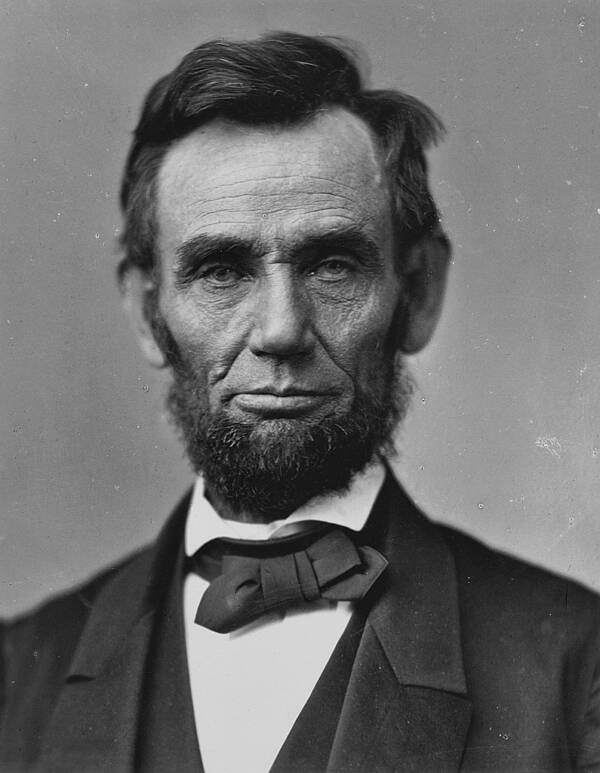
Public DomainAbraham Lincoln was famously reticent to discuss his family history during his life.
Abraham Lincoln was many things. He was the president, the “Great Emancipator,” and the man who steered the United States through the Civil War. But was Abraham Lincoln Black?
During Lincoln’s presidency from 1860 to 1865, some suggested that Lincoln had — in their view — an unnaturally close bond with African-Americans. They printed political cartoons, passed around pamphlets, and even dubbed Lincoln “Abraham Africanus I.”
But were these rumors meant to hurt Lincoln’s popularity in the racially charged Civil War years? Or did they touch on a truth about America’s 16th president and his family history?
Here’s how rumors about Abraham Lincoln’s race started — and why some think they could be true.
The Questions Surrounding Abraham Lincoln’s Race
Was Abraham Lincoln Black? When the Illinois lawyer first ran for the presidency in 1860, his foes in the South didn’t exactly question his race. But they did suggest that his presidency would upset the racial status quo.
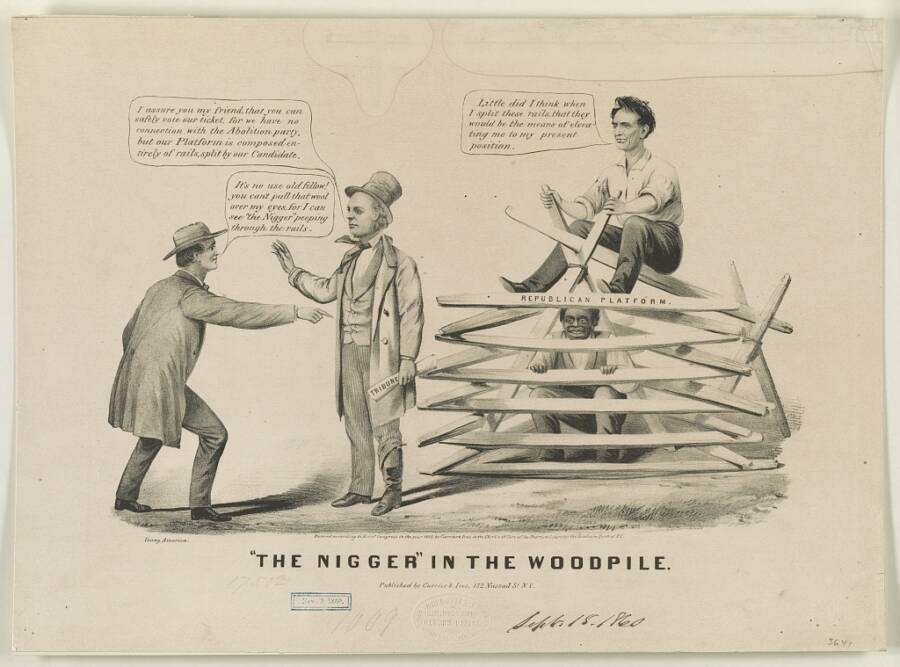
Library of CongressThis cartoon from 1860 suggests that Lincoln and the Republicans were trying to downplay their anti-slavery platform.
That’s because Lincoln and the Republican party had adopted an anti-slavery platform to run on. However, the Republicans had specifically chosen Lincoln because he was a moderate — he believed in limiting the expansion of slavery, but he did not believe in abolishing it.
To Southerners nervous about slavery’s end, that didn’t matter. Southern newspapers ran a number of scathing political cartoons in which they depicted Lincoln dancing with Black women and otherwise endorsing interracial relationships. One Georgia secessionist even warned that, under Lincoln, in “ten years or less our children will be the slaves of Negroes.”
When Abraham Lincoln won the election, Southern states promptly began to secede.
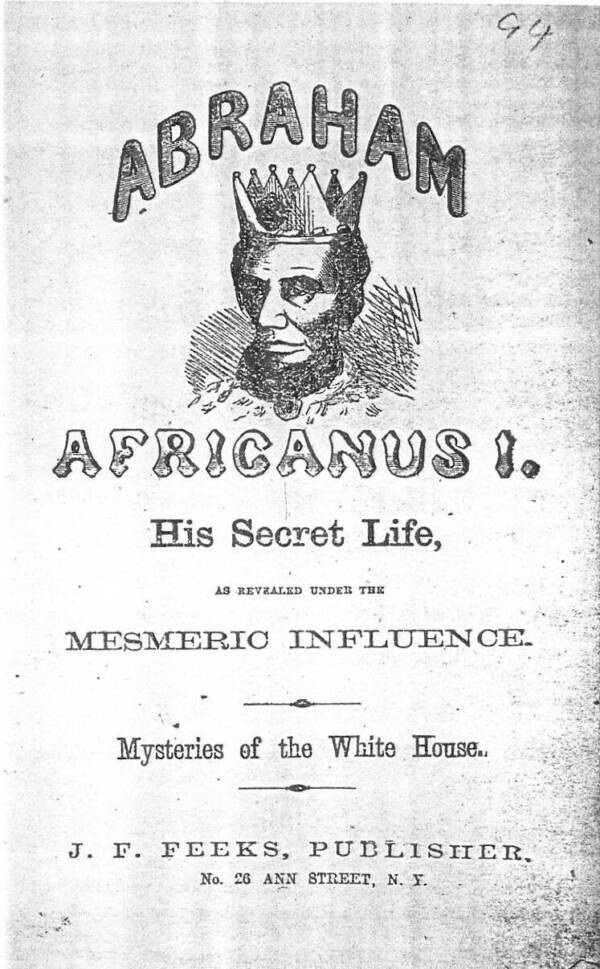
Public DomainThis Copperhead pamphlet called Lincoln Abraham Africanus I, giving him a “Black” identity.
As the Civil War progressed, people began to suggest more explicitly that Lincoln was Black — especially as Lincoln changed his position on slavery. In 1863, he announced the Emancipation Proclamation, which “freed” enslaved people in Confederate territory. One of his critics, Charles Chauncey Burr, said that Lincoln should be forgiven for having “natural sympathy with his own race.”
That next year, Burr and other Copperheads — Northerners who wanted peace with the South — dubbed Lincoln “Abraham Africanus I.” They asked, “Does the Republican Party intend to change the name of the United States? It does. What do they intend to call it? New Africa.”
The racial undertones in both instances are clear. But is there any truth to the rumors that Abraham Lincoln was Black, or was this just racist propaganda? In fact, a minority of scholars have raised some debatable evidence that the 16th-president could indeed have had African American roots.
Was Abraham Lincoln Black? Inside The Evidence
Those who believe that Lincoln was Black point to two factors: his appearance and his unknown family history.
For starters, Abraham Lincoln described himself as having a “dark complexion” and “coarse black hair.” His own father, Lincoln said, had a “swarthy” complexion, “black” hair,” and “brown” eyes. For some contemporaries, this was enough to confirm that Lincoln was black.
British journalist Edward Dicey also noted Lincoln’s “uncombed and uncombable lank dark hair, that stands out in every direction at once… and a few irregular blotches of black bristly hair in the place where beard and whiskers ought to grow.”
Dicey went on to describe Lincoln’s “nose and ears, which have been taken by mistake from a head of twice the size.”
And American writer Nathanial Hawthorne offered up a similar description, noting, “[Lincoln’s] hair was black, still unmixed with gray, stiff, somewhat bushy, and had apparently been acquainted with neither brush nor comb.”
Hawthorne added, “His complexion is dark and sallow… he has thick black eyebrows and an impending brow; his nose is large, and the lines about his mouth are strongly defined.”
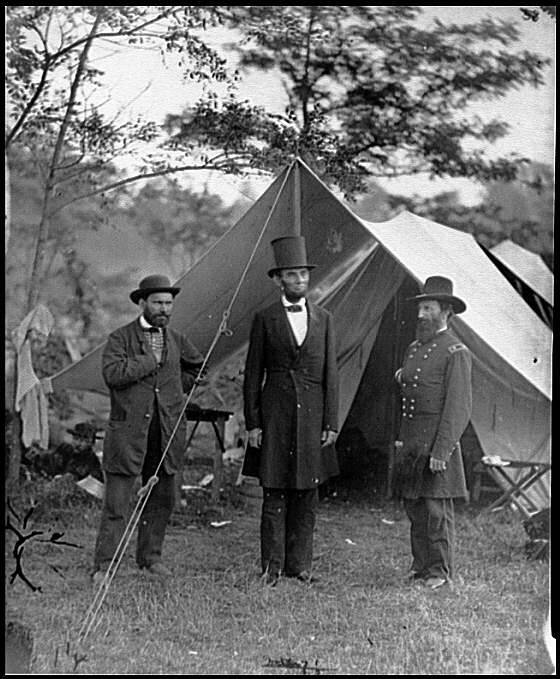
Library of CongressAbraham Lincoln with Allan Pinkerton and General John A. McClernand.
But beyond these superficialities, Lincoln came from a somewhat unknown background. His law partner, good friend, and biographer, William Herndon, noted that: “There was something about his origin he never cared to dwell upon.”
Herndon continued to say, “Mr. Lincoln usually had but little to say of himself, the lives of his parents, or the history of the family before their removal to Indiana. If he mentioned the subject at all, it was with great reluctance and significant reserve.”
Intriguingly, Herndon mentions that J. L. Scripps of the Chicago Tribune learned some facts about the Lincoln family while proposing a book on Lincoln’s life. But Lincoln didn’t want them publicized.
“[Lincoln] communicated some facts to me concerning his ancestry,” Hernon quoted Scripps, “which he did not wish to have published then, and which I have never spoken of or alluded to before.”
Hernon added, “What the facts referred to by Mr. Scripps were we do not know; for he died several years ago without, so far as is known revealing them to anyone.”
Lincoln was especially reticent to discuss his mother, Nancy, which led historian and author J.A. Rogers to speculate that Lincoln “was the illegitimate son of a Negro by Nancy Hanks.”
To some, facts like these may provide compelling evidence that Abraham Lincoln was Black. But Lincoln’s contemporaries largely viewed him as white. And the president indeed presented himself that way.
Why Some Say Abraham Lincoln Was Black, While Questions Remain
Abraham Lincoln lived in a deeply racially divided time. And though he had complicated feelings about race and slavery, he set himself apart from Black Americans.
“Certainly the negro is not our equal in color — perhaps not in many other respects,” Lincoln wrote in 1858 before adding, “Still, in the right to put into his mouth the bread that his own hands have earned, he is the equal of every other man.”
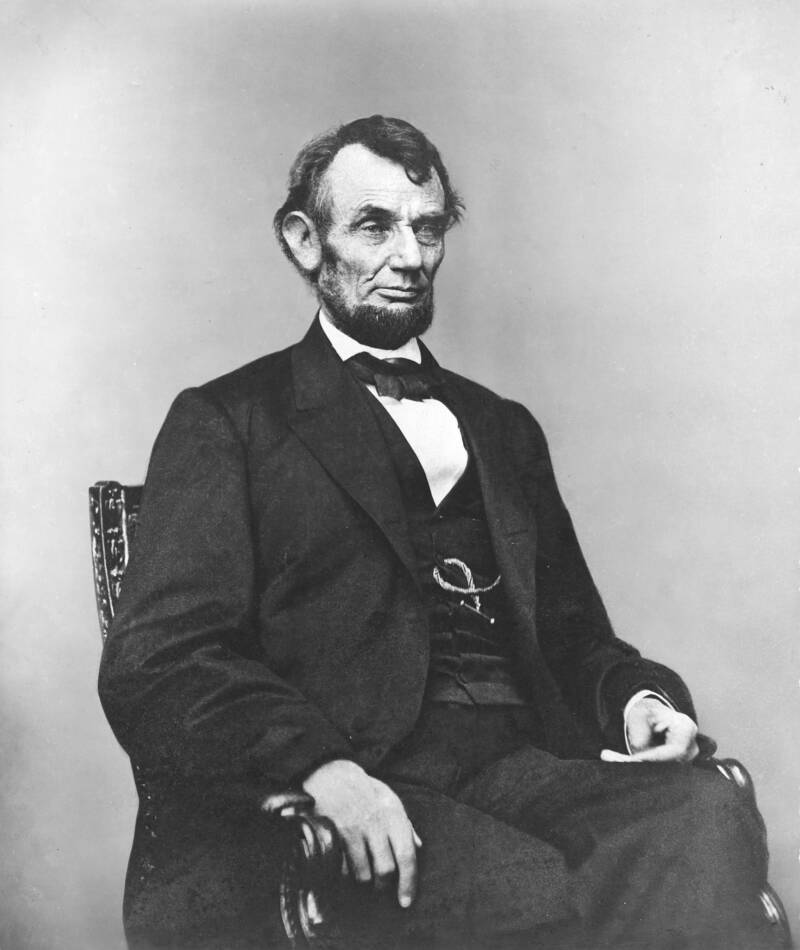
Public DomainAbraham Lincoln’s son Robert called this 1864 photo “the best likeness of my Father.”
In that statement, Abraham Lincoln draws a clear line between himself and Black Americans. And even the presidents’ Black supporters saw Lincoln that way. In 1876, the famed Black writer and abolitionist Frederick Douglass noted:
“[Lincoln] was preëminently the white man’s President, entirely devoted to the welfare of white men… He came into the Presidential chair upon one principle alone, namely, opposition to the extension of slavery.
“His arguments in furtherance of this policy had their motive and mainspring in his patriotic devotion to the interests of his own race.”
If Lincoln was Black, he certainly didn’t show that side of himself in public. But the president did have a reputation for showing an unusual warmth toward Black Americans.
Even Douglass remarked that Lincoln met him at the White House “just as you have seen one gentleman receive another.” And Lincoln shocked convalescing white Union soldiers when he warmly greeted three Black cooks at an army hospital in 1862 by shaking their hands.
Is that evidence that Lincoln was Black? Or merely that he had a more open mind than many of his countrymen? We may never know for sure.
But if Lincoln was Black, he could be one of several “white” U.S. presidents who may have had multiracial roots. Historians like Rogers have argued that Andrew Jackson, Thomas Jefferson, Warren G. Harding, Dwight Eisenhower, and Calvin Coolidge could have been Black.
Their theories are based largely on speculation, but it makes the point — if Abraham Lincoln was Black, he might have been one of many presidents with African heritage in American history.
After seeing why some think Abraham Lincoln was Black, discover the little-known story about Lincoln’s wrestling career. Or, learn about Ralph Lincoln, the 11th generation Lincoln who is the president’s doppelganger.





